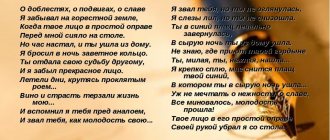- Poetry analysis
- Baratynsky
- Discouragement
The poem “Disbelief” refers to the love lyrics of Evgeniy Baratynsky. The poet himself was quite a talented and mysterious figure in the literature of his time.
In this work, the words of the poet are heard, rejecting the woman with whom his feelings were once connected. He does this quite calmly, explaining the reasons for ending the relationship and without losing his self-esteem.
The poet asks his former lover not to tempt him in vain. After all, he is completely disappointed. Moreover, not only in her, but in love in general. Although, it is possible that it was this person who was the reason for the poet’s disbelief.
From the lines dedicated to her, it follows that the young man was most likely touched to the quick by the woman. Apparently there was a rather serious quarrel between them. Which one exactly remains unclear. But, based on the fact that the author no longer believes in love, it is quite possible that he was deceived by his beloved. Maybe there was another reason.
It is not so important what happened between the young people, but what is important in this poem is the consequences of these events and the feelings they caused in the poet’s soul.
He is disappointed, and going back to the old way is no longer possible. Establishing relationships between them can only lead to mental unrest and torment for the young man. He is not one of those people who believes what he has already been deceived by. The poet talks about this in his poem.
He asks the girl not to bring up even a word about the past, so as not to disturb him. He puts an end to failed relationships quite decisively. And this is most likely due to the fact that the feelings that he once had for this person were not so deep. After all, how often do people who love deeply forgive their chosen ones a lot, although sometimes it is not easy.
But there is no longer any love in the poet’s soul for this girl; she will no longer be able to awaken what was there. And for him, as it sounds in the poem, sleep is sweet, something behind which he can hide all his emotional experiences without delving into them. This was the state the poet was in when these lines were written on paper.
And this state is characteristic of quite a few people who have experienced the bitterness of disappointment. And this may also indicate that the true reason, most likely, lies not only in the girl to whom these lines are dedicated. After all, true disbelief in everything comes only as a result of several failures.
But if you look at this work from a slightly different angle, you can see a slightly different picture. And, at the center of it will not be a young man in love and deceived, but, on the contrary, a man who loves to win women’s hearts and then grow cold towards them. And after that, he explains the reason for his cooling by disbelief in love and disappointment in dreams. But this, in turn, can also have several reasons.
The human soul is multifaceted and, at times, incomprehensible and contradictory. And the feelings are completely complex and deep. And, it is often easier to lose yourself in a sweet sleep than to understand them.
8th, 9th grade
"Confession" (1823; 1832–1833)
Do not demand feigned tenderness from me: I will not hide the coldness of my sad heart. You are right, there is no longer in him the beautiful fire of My original love. In vain did I bring to mind both your sweet image and my former dreams: My memories are lifeless, I made vows, but I made them beyond my strength.
I am not captivated by another beauty, remove jealous dreams from my heart; But long years passed in separation, But in the storms of life my soul was entertained. You already lived as an unfaithful shadow in her; I have already called out to you rarely, under compulsion, and my flame, gradually weakening, went out of its own accord in my soul. Believe me, I'm the only one pathetic. The soul desires love, But I will not love again; I will not be forgotten again: only our first love completely intoxicates us.
I'm sad; but sadness will also pass, signaling Fate’s complete victory over me: Who knows? I will merge with the crowd by opinion; A girlfriend, without love, who knows? I will choose. For a considered marriage, I will give her my hand, And in the temple I will stand next to her, Innocent, devoted, perhaps, to the best dreams, And I will call her mine, And the news will come to you; but do not envy us: There will be no exchange of secret thoughts between us, We will not give free rein to spiritual whims: We are not hearts under marriage crowns, We will unite our lots.
Goodbye. We walked along the same road for a long time: I chose a new path, choose a new path; Tame the fruitless sadness with reason and do not, I pray, enter into a vain court with me. We have no power in ourselves And, in our young years, We make hasty vows that may be funny to the all-seeing fate.
“‘Recognition’ is perfection. After him, I will never publish my elegies,” Pushkin wrote with annoyance to Alexander Bestuzhev, having read Baratynsky’s new elegy in Polar Star for 1824.
In “Confession,” Baratynsky took an even more confident—compared to “Disbelief”—step from poetic convention to psychological reflection, as in a diary or novel. The effect of special authenticity gave the poem real anti-poeticism - the mention of a marriage without love, which the lyrical hero consciously decides on:
A girlfriend, without love, who knows? I will choose. For a considered marriage, I will give her my hand, And in the temple I will stand next to her, Innocent, devoted, perhaps, to the best dreams, And I will call her mine...
Against the background of the melodramatic expectations of the genre, a strong move appears to be the recognition of indifference, inability to feel - and the acceptance of this as inevitable, even natural (although twenty years earlier the “Russian Schillers”, for example Andrei Turgenev, could neither come to terms with this indifference, nor find language for its internally convincing description).
Without “Confession”, Pushkin’s later paradoxical poems about love would have been impossible - “Under the blue sky of his native country...”, which captures a very similar impression of the fact that a former passionate feeling turned into indifference, and “On the hills of Georgia...”, in which , on the contrary, the power of the love feeling in itself is declared.
Excerpt from the film "We'll Live Until Monday." Directed by Stanislav Rostotsky. 1968
Analysis of the poem “Disbelief”
“Disbelief” is the second most popular after “Confession” in literary studies. She is a vivid example of revealing the theme of the lyrical hero’s “disappointment” in feelings. If in previous elegies the hero tried to resurrect himself at a feast or with a new hobby, here he has already become disillusioned with these attempts. From the very first lines, the hero’s inability to love is directly stated:
Do not tempt me unnecessarily with the return of your tenderness: All the seductions of former days are alien to the disappointed! I don’t believe in assurances, I don’t believe in love, And I can’t indulge again in dreams that have once changed! Do not multiply my blind melancholy, Do not start a word about the past, And, caring friend, do not disturb the sick person in his slumber! I sleep, the sleep is sweet to me; Forget your old dreams: There is only excitement in my soul, And it’s not love that you will awaken.1
There is not even any exposition in the composition of this poem. According to the scheme considered by Gasparov, here there is a refusal immediately, “and then follows the true move, a characteristic of the actual state of the soul. Here we are already standing on the brink of our scheme, on the brink of elegy and romance.”2 No wonder the composer M. Glinka wrote a wonderful romance based on the verses of “Disbelief.”
The elegy begins with the lyrical hero’s request not to “tempt” him “unnecessarily.” “Tempt” is a very colorful word. In Dahl's dictionary we can find its meanings:
“to tempt, to seduce, to confuse with temptation, to entice with guile; try to seduce someone from the path of good and truth”3.
The hero is able to be seduced by the new tenderness of a “caring friend”; feelings of desire for her, embarrassment, “excitement” are able to awaken in him, as we learn in the end. But is it right to make him feel this excitement? Will this not be a deception that will seduce the hero from the true path - the path of peace and sleep? The hero is sure that this is a deception and that it is useless and unnecessary. Semenko notes:
it can be assumed that the heroine’s recent indifference contributed to the poet’s “discouragement.” 4
Tenderness has returned to the heroine, and she wants to give it to the hero again. But he no longer needs her, as he explains, because he has become disillusioned with the “seductions of earlier days.” “Seduction” is also a bright word here. Its meanings in the dictionary:
"blarney; lure, entice; to persuade something with sly caresses, to flatteringly fool, to entice, by seducing with something; seduce"3.
Seduction - love, tenderness, dates, feasts with friends - all this is a deception, and the hero now understands this. He suffered from general disappointment, this “disease of the century” that we mentioned in the introduction. The second stanza, where the hero emphasizes his disappointment not in the heroine’s love, but in love in general, proves this. “The poet doubted not the assurances of his beloved, but “assurances” and “love” in general. Therefore, psychological concepts are given in a form abstracted from reality: “tenderness”, “seduction”, “confidence”, “love”. The absoluteness of the denial is reinforced by the repetition: “I don’t believe the assurances.”4 - says Semenko. The lyrical hero cannot again trustingly and completely surrender to “dreams that have once changed.” His experience will not allow him to do this, and there is no point in pretending to be in love again. We cannot truly enjoy happiness and love when we understand that it is a deception, an illusion, a dream, and that it is not durable and fragile. Just as it is impossible to trust a person who has betrayed us even just once, so it is impossible to trust again feelings that have already betrayed us. The hero calls previous seductions “dreams.” They were not real, but only illusions. Stupid youth, ignorant of life, striving to decorate and transform the boring, rational world around, creates these dreams of love, friendship, happiness. Both lovers fall into this dream, but time dispels it, experience shows the true picture of things. The past was a dream, but what about the present? In the last stanzas, the lyrical hero again turns to his beloved. Her attempts to return everything only awaken in the hero longing for the past. He feels sorry for those sweet dreams, but nothing can be done. He asks the heroine to forget “old dreams.” It is already too obvious that they will not come true. It seems that the matured, experienced hero now sees the world soberly and understands what is real and what is not. But it turns out that everything is wrong:
And, caring friend, do not disturb the patient in his slumber! I'm sleeping, the sleep is sweet for me;1
The past is a dream, the present is also a dream. Here again the motif of the “sick soul” is present. This state of disappointment is a disease, in the understanding of the lyrical hero. Perhaps the returning tenderness of the heroine forces him to reflect, and this, among other things, awakens excitement and intensifies melancholy. The hero tries to forget himself, fall asleep, and not remember the past. Like Hamlet’s “To die, to sleep, no more,” only here it is not real death, but death—disappointment, the sleep of a sick soul. The hero finds his sleep sweet because it does not disturb or excite him. Semenko noted:
“Dream” is the basis of the entire figurative structure of “Disbelief.” The “sleep” of the last verses turns out to be akin to the “dreams” of the first. This “drowsiness” of the patient, this calmness of his, is also a kind of “seduction”, which the poet asks “not to disturb” for now. His skepticism is uncompromising: isn’t it an illusion that the former beloved is now a “caring friend”4?
The poem ends with the technique of “incomplete contrast”:
There is only excitement in my soul, And it is not love that you awaken.
I. L. Almi compares this excitement with Onegin’s excitement after reading Tatyana’s letter. Also in her analysis of this elegy she states that
“Having seen the source of his hero’s suffering in his own soul, “previously immature,” Baratynsky freed himself from the need to look for the deliberate culprits of this suffering. None of the characters in “Disbelief” are to blame for the break; what is happening is stronger than them.”5
The hero sees the illusory nature of love, the deception of happiness. He blames the feelings themselves, and not the heroine, although at the same time he does not try to convey his disappointment to her, to prove to her the fragility of her tenderness, her dreams. He simply asks you to forget them. No wonder he calls her a “caring friend.” There is no deceit, coquetry and hypocrisy in it, which are traditional for love elegies. She is sincere in her returned tenderness and care. “It recognizes the possibility of the best feelings and motives,”5 as Almi says.
The elegy exudes feelings of emptiness and humility that engulf the lyrical hero. The exclamatory sentences that form the first three stanzas contrast with the content in such a way that it is hard to believe that there is an exclamation mark at the end. Apparently, the hero really wants to convince the heroine to leave him alone. Almost all the verbs here are used with a negative particle: “don’t tempt”, “don’t believe”, “can’t”, “don’t multiply”, “don’t.” This emphasizes the hero's reluctance to awaken from sleep. In the lines “I don’t believe in assurances, I don’t believe in love,” anaphora strengthens the confidence in the hero’s disappointment.
Note:
- Thought armed with rhymes. ed.2e. //Poetic anthology on the history of Russian verse. Compiled by V.E. Kholshevnikov. Leningrad: Leningrad University Publishing House, 1967.
- Gasparov M.L.. Three types of Russian romantic elegy. Individual style in genre style // Context-1988 M., 1989.
- V. Dal “Explanatory Dictionary of the Living Great Russian Language” 1863-1909.
- Semenko I.M.. Poets of Pushkin's era. M.: Fiction, 1970.
- Almi I.L. Elegies E.A. Baratynsky 1819-1824 // Almi I.L. About poetry and prose. St. Petersburg: Skifia, 2002.
Genre, size, direction
E. Baratynsky is a representative of early romanticism in Russian literature. This trend began to develop in Europe, borrowing its sensuality from sentimentalism. The tradition of elegy developed very actively during this period. In Russian literature, Baratynsky was one of the first to work in this genre. His fellow writers were Pushkin, Zhukovsky, Davydov, Lermontov. They were all attracted, including the elegy, with its lyrical, sublime content. The poem “Romance” (1834) by D. Davydov can be considered the closest to Baratynsky’s work. The works are similar in many motifs and in form, but are still independent of each other.
Baratynsky chooses iambic tetrameter for “Disbelief,” a meter that brings the verse closer to natural colloquial speech. Perhaps this was the reason for M. Glinka to write the music of the romance, named after the first line of the work.





